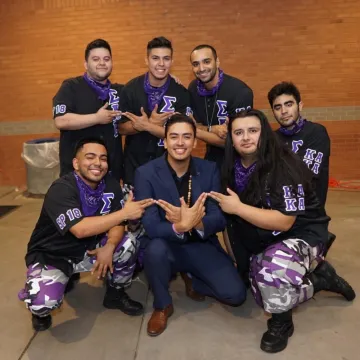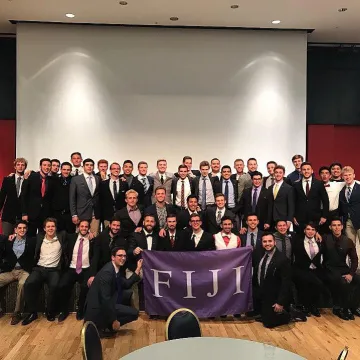The University of Arizona is home to 30 national fraternities.
The question is which one is right for you?
All chapters at the UA belong to a governing council. Both the United Sorority & Fraternity Council (USFC) and the Interfraternity Council (IFC) are home to fraternities and offer different experiences.
United Sorority & Fraternity Council Fraternities
Learn more about joining a USFC fraternity here
The United Sorority & Fraternity Council (USFC) represents 9 identity based sororities and 9 identity based fraternities including historically Black fraternities and sororities.

Why join a USFC chapter?
- The bonds. USFC fraternities are smaller, tight knit, family-like organizations. Not only are fraternity members close with one another, they are close with other USFC sororities and fraternities at the UA and also across the country.
- Service to the local community. USFC fraternities are committed to hands on service to the community and often serve underrepresented communities right here in Tucson!
- The experience. USFC fraternities are identity based meaning they were founded to celebrate a culture such as Asian, Latinx, LBGTQ+, African American, or multicultural. This does not mean you must be of a specific identity to join- to the contrary! - those with an appreciation for the culture are certainly welcomed.
- Lower cost. USFC dues are affordable and council recruitment events are totally free!
Qualifications
Most, not all, USFC fraternities allow only those with an established college GPA to pursue membership meaning you are not able to join your first semester. The recommended minimum GPA to join a USFC fraternity is a 2.5 cumulative from college; however, many require a 2.75 cumulative college GPA. All USFC fraternities will expect applicants to have ample documented community service hours, community involvement, and campus leadership. Please contact individual fraternities for their specific qualifications.
USFC Week
Are you interested in joining one of the Member Organizations of the United Sorority & Fraternity Council? USFC is excited to present USFC Week during the second week of classes. You will have the opportunity to learn about any organizations you are interested in and get to know the members and chapter's unique recruitment/intake process.
Joining opportunities
The United Sorority and Fraternity Council will host council wide events for you to meet the chapters. Visit the USFC website for event information.
The processes for joining a USFC fraternity vary by organization. The best way to learn about that process is by visiting the national website of the fraternity/ies you are interested in or asking a member of the chapter.
Also:
- Visit USFC sororities tabling on the mall at the beginning of each semester.
- Explore the national and local websites of each sorority.
- Attend campus programs put on by individual chapters.
- Learn more about the philanthropy and service focus of each organization.
Who are the USFC fraternities?
Click here for a listing of the fraternities and links for chapter websites
Follow us on Instagram for more information @uausfc
Interfraternity Council Fraternities
Learn more about joining a IFC fraternity here
The Interfraternity Council (IFC) represents 21 general men’s fraternities. The North American Interfraternity Conference (NIC) provides direct support, resources and services to IFC officers, representatives, advisors and alumni to further the health and success of local fraternity communities.

Why join an IFC chapter?
- The bonds. IFC chapters vary greatly in size ranging from 10-150. Some are small, family-like organizations while some are quite large but the average size is 85 members. Brothers often form the closest bonds within their own new member class.
- Engagement. IFC Fraternities are engaged across campus including student leadership roles and intramural sports. The Interfraternity Council chapters raises thousands of dollars each year for Tucson’s Emerge! Center Against Domestic Abuse.
- The experience. IFC fraternities place a large amount of importance on academics, leadership, and campus involvement. Chapters also have a variety social and recreational activities such as formals, theme parties, and fun philanthropic events. Most IFC chapters have a chapter facility (house) however the majority of members do not live in. Organizations without housing have an equally fulfilling experience utilizing campus and Tucson locations for dinners, meetings, and social events.
Qualifications
The Interfraternity Council encourages men going through the formal recruitment process have a minimum a 2.75 Core GPA from high school or a 2.5 college GPA if you have 12+ college units. Each fraternity must follow their own national academic standards and will not accept men below the individual standard. All Interfraternity Council fraternities will expect applicants to have community service experiences, community involvement, and high school/campus leadership.
Joining opportunities
Any male student is able to join a fraternity when he determines it is in his best interest. All fraternitites are free to determine when they wish to extend an invitation to join to a male student.
One primary way men join a Interfraternity Council fraternity is through IFC recruitment. Learn more about joining a IFC fraternity.
Who are the Interfraternity Council Fraternities?
Click here for a listing and links for chapter websites.
Benefits of joining a recognized IFC fraternity
All of the IFC fraternities listed here are recognized by the University of Arizona and their Inter/national fraternity. All recognized IFC fraternities receive the following benefits of recognition:
- Oversight from the Fraternity & Sorority Programs department
- Participate in all Fraternity & sorority Program leadership and educational opportunities
- Participate in all University of Arizona activities including Spring Fling and Homecoming
- Able to host joint social events with sororities
- Upon graduation members will be considered University of Arizona alumni
- Access to all national leadership conferences
- Ability to registers on or off campus social events
Organizations on loss of recognition status
Unfortunately, some fraternities engage in behaviors inconsistent with the expectations and policies of the institution and/or national organization. While many of these organizations typically cease all activity, some may present themselves as fully functional organizations which continue to recruit members. The Interfraternity Council urges students and their family members to carefully consider joining a organization that does not have university recognition.
To see the current listing of organizations which have had their recognition revoked, see our Judicial page. In addition, you’ll see a listing of recognized organizations which may have been sanctioned with a specific status due to lesser behaviors which have not warranted revocation of recognition.
With questions about access or to request any disability-related accommodations that will facilitate your full participation in any of the above mentioned programs or events such as ASL interpreting, captioned videos, Braille or electronic text, etc. please contact: Fraternity and Sorority Programs at
dos-greek@arizona.edu.The University of Arizona is committed to fostering a learning, working, and living environment free from all forms of discrimination, including harassment. The University’s Nondiscrimination and Anti-harassment Policy prohibits discrimination and harassment on the basis of race, color, national origin, sex, religion, age, disability, veteran status, sexual orientation, gender identity, or genetic information. Fraternities and sororities do not discriminate in membership selection practices on any basis prohibited by law or policy, except for the exemption on the basis of sex granted under Title IX of the Education Amendment Act of 1972 for social fraternities/sororities.

